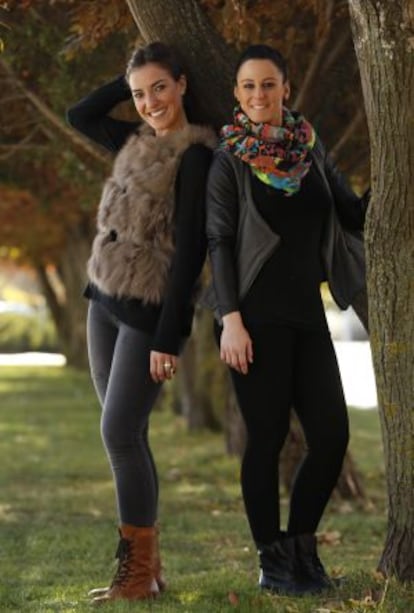“After London people have been taking more notice of women’s sport”
Spain handball players Eli Pinedo and Macarena Aguilar look forward to the coming world championships

Meetings of the Spanish women's handball team have become akin to a course in European culture since it won bronze at the London Olympics. The parlous state of the national league led most of the team to seek their fortunes in Denmark, Germany, France and Hungary, among others; just four of the squad selected to represent Spain at the World Championship in Serbia from December 6 to 22 play in their home country. One of these is Eli Pinedo, the captain of Bera Bera, last season's league champion. She has played abroad, at Rangers HK in Denmark, where she shared the locker room with Spain teammate Macarena Aguilar for more than a year.
Question. What did you find abroad?
Macarena Aguilar. Lots of people think you go for the money, but it's more than that. Some of my teammates had to leave because their clubs stopped paying them. Stability is a big thing and growing as a player. If you want to remain in the elite, you have to take that step. The level of competition is much higher abroad.
Eli Pinedo. I came back when things weren't so bad. I lived the experience but I missed my people, my home, and I always wanted to come back to the club I'm at now, where I started my career. Although I'm happy, it's true that the league is not at the same level [as others]. It's not that it's boring, it's that things are done differently. I will defend to the death those that have gone overseas, because they want to become better players. The majority of people who play in Spain do it for love of the game. Many don't have professional contracts, or don't get paid...
M. A. It's completely different in Denmark. There handball and badminton are the national sports. It's like soccer here: the stadiums are full, games are on television, reports in the newspapers...
EL PAÍS. Since 2008, this team has won Olympic and World bronze, plus European silver. What has changed?
E. P. We've grown a lot as a team and we play a different sort of handball to other teams. And above all, bit by bit, we have come to believe that we can do something at major tournaments.
M. A. You can see the sporting evolution, but also in media interest as well. A few years ago nobody had heard of women's handball. Now everyone knows a little bit. If you say you play handball to someone, they'll say "oh yeah, I saw that bronze-medal match."
If you say you play handball to someone, they'll say "I saw that bronze-medal match"
EL PAÍS. Do you feel valued?
M. A. From where we were a few years ago to now, of course. But it could be much more, for sure. After London people have been taking more notice of women's sport, trying to get it more recognized. But if all you put on the television is soccer, soccer, soccer, what you get is soccer, soccer, boys, boys, boys... That mentality still needs to change.
E. P. For me, we need to talk about good athletes, about success in sports, and not so much about men's and women's sport.
M. A. Sometimes it seems like there's a rivalry. "The men's handball team did this, the women's team did that..."
EL PAÍS. What are the keys to the World Championship? Will not winning a medal be a failure?
E. P. No. Obviously we want to get on the podium; we'll go for it, but it's not going to be easy.
M. A. The group isn't that complicated. The problem will be in the last 16, because wherever you finish in the group, you'll get a tough opponent. Although if we play like we know we can, we can beat anybody.
Tu suscripción se está usando en otro dispositivo
¿Quieres añadir otro usuario a tu suscripción?
Si continúas leyendo en este dispositivo, no se podrá leer en el otro.
FlechaTu suscripción se está usando en otro dispositivo y solo puedes acceder a EL PAÍS desde un dispositivo a la vez.
Si quieres compartir tu cuenta, cambia tu suscripción a la modalidad Premium, así podrás añadir otro usuario. Cada uno accederá con su propia cuenta de email, lo que os permitirá personalizar vuestra experiencia en EL PAÍS.
¿Tienes una suscripción de empresa? Accede aquí para contratar más cuentas.
En el caso de no saber quién está usando tu cuenta, te recomendamos cambiar tu contraseña aquí.
Si decides continuar compartiendo tu cuenta, este mensaje se mostrará en tu dispositivo y en el de la otra persona que está usando tu cuenta de forma indefinida, afectando a tu experiencia de lectura. Puedes consultar aquí los términos y condiciones de la suscripción digital.









































